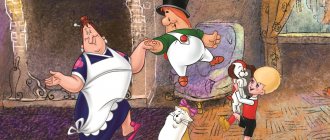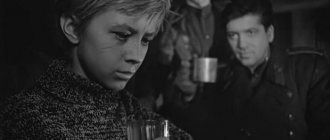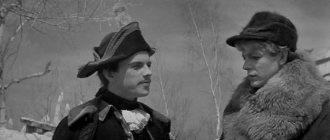A very brief retelling of the story “Petka at the Dacha.”
A ten-year-old boy, Petya, is apprenticed to local hairdresser Osip Abramovich. The boy is mercilessly exploited, forced to do hard work and threatened with punishment, and not allowed to get enough sleep. He is thin and weak, fine wrinkles are visible near his eyes, he is constantly malnourished, and walks dirty. Petka’s whole life seems somehow unreal, like a dream. Despite the constant apathy, the boy feels that he is being drawn to another place, but he himself cannot understand where. When Petka’s Mother visits him, he asks to be taken away, but then he says goodbye to his mother listlessly and everyday life begins again.
One day, the mother takes the boy to the gentlemen's dacha in Tsaritsyno, where she worked as a cook. On the train, Petka kept hovering near the window - how amazingly the pictures outside the window changed. He has never been to the village, so the forests, clearings and river seem strange to him, but interesting. Over time, Petka gets used to his new life. He is sure that the dacha is exactly the place that his soul, eager for the unknown, wants.
In the village, the boy finds a friend - high school student Mitya. The two of them have a good time, walking and fishing. Petya's wrinkles disappeared from his face, he gained weight and became a childishly playful boy. Nature and freedom from responsibilities revived the child.
But it all ended suddenly - he was told that it was time to go home. At first Petya throws a tantrum, then he resigns himself, meekly and sadly looking at the passing pictures in the train window. Once in the hairdresser's, he again hears the screams of Osip Abramovich, and, shuddering, runs to the call. And at night, in a whisper, he tells his partner Nikolka about the dacha.
Country house
The story “Petka at the Dacha,” a summary of which is presented in this article, does not end there. One day at lunch, Nadezhda unexpectedly arrived and told Petka that he and she were being allowed to stay at the dacha in Tsaritsyno, where her gentlemen lived. The boy had a vague idea of what a dacha was, but inside he felt an inexplicable joy. What he dreamed about happened. He will go to the very place where he unconsciously strove. I wonder what it is? The station with its noise, bustle, and hurried passengers; a train carriage, bright landscapes rushing past the window; an endless brooding forest, a clear, wide sky that cannot be seen in the city; glades, cheerful, bright, green - new impressions frightened, excited, and at the same time filled his soul with unprecedented delight. He looked and was afraid to miss, to lose the slightest detail of this new world for him.
Two days have passed. Having just been torn from the “stony embrace of the city communities,” pale, excited, afraid, like a puppy, of the blue surface of the lake, Petka already felt at home at the dacha and completely forgot that there was a hairdresser, Osip Abramovich and the eternal cry: “Boy, water !” He gained weight even though he ate very little. Imperceptibly and somehow suddenly the wrinkles disappeared from his face, as if someone had gone over them with a hot iron. He learned to carve a fishing rod in a hazel tree, dig for worms and fish.
Minor characters and their characteristics:
- The master is the owner of the cook Nadezhda, Petka’s mother. A compassionate and kind person who takes pity on the boy.
- Procopius and Mikhaila are lazy apprentices of Osip Abramovich. In the absence of the owner, they send Nikolka to receive a visitor and laugh at the boy for his unsuccessful haircut. Procopius often disappears at night, and during the day he sleeps behind a partition. Mikhailo reads newspapers in search of familiar visitors among crime chronicles.
- Mitya is a high school student from the village of Tsaritsyno, a friendly and cheerful boy who showed Petya his games.
- Nadezhda is Petya's mother. A kind, poor and lonely cook. She truly loves her son and tries to take care of his well-being. He gives Petya to the service of Osip Abramovich in the hope that he will put him on his feet.
- Osip Abramovich is Petit’s strict guardian, an indifferent and callous person who demands that the boy immediately carry out orders and often punishes him without reason.
- Nikolka is a brash teenager with bad manners. He has been working for Osip Abramovich for a long time, and is about to become an apprentice. Nikolka brags to Petya about vulgar stories about visitors to the hairdresser, smokes and drinks vodka. Listening to him, Petya concludes that Nikolka is a disappointed person in life, in whose soul there lives a sick child. When the boy’s mother comes to see him, Nikolka feels resentful and sad because he doesn’t have a mother.
A summary of the story “Petka at the Dacha” in detail.
Ten-year-old Petka works in Osip Abramovich's hairdressing salon. The barber shop is located in a block of houses where there is “cheap debauchery.” In a dirty room, an unpretentious contingent is getting their hair cut - the gentlemen's service staff and "a la handsome men" local dandies.
Author: Leonid Nikolaevich Andreev
Petka is the youngest of Osip Abramovich’s servants. He gets yelled at most often. Together with him, Nikolka, a student who will soon become an apprentice, works in the hairdressing salon. The boy is three years older, smokes cigarettes, swears, lies about trying vodka, and tries to seem like an adult. The apprentices Mikhail and Procopius entrust him with haircuts for simpletons. Alone with Petya, Nikolka became kind and taught the boy the basics of hairdressing.
Often the two of them sit by the window, next to a wax female bust, and watch the morning life of the boulevard. Nikolka tells vulgar stories about the inhabitants of the street he knows, and, grinning, laughs at them. It seems to Petka that his friend is very smart and he really wants to be the same. But now the boy dreams of another place.
Days at the hairdresser are monotonous and boring. At any time of the year the boy saw the same thing. Two mirrors - crooked and with a crack, a picture with two naked women, red-haired from the soot of a kerosene lamp. Every day Petya heard the same cry: “Boy, water!” And he endlessly supplied this water, without holidays or weekends. On Sundays, when the hairdresser is not open, he sits on a chair for a long time, either dozing or in heavy thoughts.
What was happening around Pete seemed like a long dream. The boy was losing weight, often did not hear a scream or spilled water. His unkempt appearance only caused disgust among visitors. And he himself did not know what to call his condition. He wanted to go somewhere else, but he didn’t understand where exactly.
Petya is sometimes visited by his mother, the cook Nadezhda. He lazily eats her sweets and asks her to pick him up from the hairdresser. But then he forgets about the request and indifferently leaves his mother, not wondering when she will come again. And Nadezhda perceived her son as a fool, thinking with grief that not everything was right with his head.
Petya did not wonder how long he would live like this. But one day my mother arrived. After talking with Osip Abramovich, she told the boy that he was going to Tsaritsino, to her master’s dacha. Petka realized that the dacha was the place he had dreamed of and began to hurry his mother, not paying attention to Nikolka, who was standing nearby. The impudent hairdresser's apprentice looked at Nadezhda angrily, but melancholy was noticeable in his eyes - he did not have a mother who would take her to the dacha.
The station greeted them with a discordant response and the roar of trains. When Petka and his mother got into the carriage, he stuck to the window, looking out at the city. Through the glass the field seemed strange, the forest looked like grass, and the sky looked wide and clear. The boy rushed from one side to the other of the carriage, trustingly touching with his dirty hands the passengers smiling after him. One of the fellow travelers, reading a newspaper, looked at the boy with hostility. Nadezhda hastened to justify herself:
- He’s going for the first time, he’s interested...
In response, the passenger muttered agreement and buried his face in the newspaper. Petya’s mother also wanted to explain to the gloomy man that her son had been serving as an apprentice for three years, because she, a weak and lonely woman, could not raise him herself. But looking at the master’s angry face, she left this thought to herself.
The train rushed past a hummocky dark green plain with gray houses along the edge, then took off onto a bridge and hovered over the blue surface of the river. Petka shuddered in surprise, but immediately clung to the window, as if afraid of losing the magic of the moment. The boy's face changed - now he did not seem sleepy and disheveled, the wrinkles disappeared under his eyes, and his eyes shone with mischievous sparkles.
The first two days at the dacha literally knocked me off my feet with a wealth of impressions, crushing Petka’s timid little soul. The modern savage, brought up by the stone embrace of the city, felt powerless before living nature. He was afraid of the endless, dark, noisy forest and light, green meadows. The boy was worried and happy, turned pale and trembled, walking along the wooded banks of the pond.
At first he returned to his mother. The master asked if he liked it at the dacha. Smiling embarrassedly, the boy answered:
- Fine.
After a couple of days, Petka was already in complete agreement with nature. And the high school student Mitya from Old Tsaritsyn assisted him in this. He was fishing on the river when he saw Petka. The boys quickly found a common language and became friends. First they fished, then they went swimming. Petka couldn’t swim and was afraid to go into the water. And when I went in, I didn’t want to get out. He comically beat the reins with his hands, pretending to swim, choked, raising splashes, and looked like a puppy who got into the water for the first time.
According to the idea of Mitya, who is inexhaustible for adventures, the boys explored the ruins of an old castle - they sat on a roof destroyed by trees or wandered among the ruins of some building. Young mountain ash grew between the rocky piles, and scary faces could be seen in the window embrasures. Petka felt at home at the master’s dacha and completely forgot about the existence of Osip Abramovich and his hairdresser.
Nadezhda was happy. It seemed to her that her son had gained weight because she fed him a lot. But Petka ate little - he simply had no time to chew, he needed to have time to bathe, cut hazel fishing rods, dig out worms. The boy ran barefoot, which is a thousand times more pleasant than wearing boots with thick soles. He took off his supportive jacket and immediately looked younger. He wore it in the evening when he went to the dam to watch the gentlemen riding in boats.
At the end of the week, in the evening, a gentleman from the city brought a letter for Nadezhda and read it to her. She cried, rubbing the soot on her face with her apron. From the abrupt phrases one could understand that the conversation was about Petka. At this time, Petka himself was playing hopscotch in the backyard.
The master came out of the house, approached the boy and put his hand on his shoulder:
- We have to go, brother.
Petka smiled silently and embarrassedly. The master thought that the boy was an “eccentric”:
“We have to go, brother,” he repeated.
The boy continued to smile. Nadezhda came up and confirmed the master’s words:
“You need to go, son, to your master, Osip Abramovich.”
Petka’s mouth suddenly became dry, and his tongue moved with difficulty. He forgot about the city, and the place he wanted so much had already been found.
– Shall we catch fish tomorrow? There's a fishing rod here...
- Requires you to come. He says Procopius is ill, people don’t come. Don’t worry - he’s kind, maybe he’ll let you go again.
But Petka didn’t cry, he just didn’t understand. Here is a real fishing rod and a ghostly Osip Abramovich. Gradually my thoughts began to clear up. The movement began, and the dry fishing rod turned into a ghost, and Osip Abramovich became tangible.
Suddenly Petka screamed as loudly as the loudest man had ever screamed. The boy fell and began to roll his body on the ground. His cry and action surprised his mother and upset the master. A little later, when he calmed down, the master said to the lady:
“I told you, childhood grief is short-lived.”
“But I feel so sorry for the boy...” she answered.
- You're right, they live terribly. But there are those who live even worse.
The next morning Petka went to the city by train. Green fields gray with dew floated past, but he did not run across the windows, trying to make out the landscapes. The boy sat quietly and calmly, humbly folding his hands in his lap. His old, worn jacket hugged his thin body, and the same drowsiness and apathy appeared in his eyes. The platform flashed by and the train stopped. Nadezhda and her son went out onto the platform, and the greedy city prepared to devour its next victim.
In front of the barber shop door, the boy quietly asked his mother to hide the fishing rod. Again in the stuffy and dirty room there was a sharp cry of “Boy, water!” and visitors watched as a hand reached out to the mirror-glass under the menacing whisper of “Well, just wait!” This meant that the eternally sleepy boy spilled the water again.
At night, from the place where Petka and Nikolka were sleeping, a child’s voice could be heard, enthusiastically talking about the dacha and what did not happen, no one saw or heard. In the quiet silence, an energetic voice would occasionally cry out, “Oh, devils, let them get out!” Yes, a passing convoy convoy thundered powerfully in the street.
Summary
The work begins with a description of Osip Abramovich's hairdressing salon. It was located not far from the house of debauchery, so the audience came undemanding. Osip always had apprentices on hand. There were also 2 boys as assistants. One of them, Nikolka, was preparing to become an apprentice. He imitated adults, smoked and spat through his teeth. Petka was only 10 years old and carried out various assignments.
When there were no tasks, the boy listened to Nikolka or looked outside. Local women were simply dressed and often drank vodka and smoked. Sometimes men beat them, but no one stood up for them. Nikolka knew a lot of dirty stories and Petka respected him, secretly dreaming of being like the guy.
The boy's life was boring . He served water and washed the floors. He constantly wanted to sleep, his dirty neck and face caused hostility. Petka begged his mother to take him, but she couldn’t.
Once Nadezhda managed to persuade Osip to let his son go to the dacha for a while. Her gentlemen rested there.
The boy did not know what a dacha was. The station amazed him, and as soon as the train started moving, he was stuck to the window. Nature amazed him. When they arrived, the forest immediately began to have a beneficial effect on the boy. Petka met high school student Mitya. He showed how to fish, swim and wander through the grass barefoot.
But a week later a letter arrived in which Osip demanded the return of his assistant . All Petka’s thoughts were already occupied with other things and he forgot about the hairdresser, but his mother told him to come back. He began to scream and roll on the ground, but to no avail. On the train he was apathetic and lethargic, but in the hairdresser the same thing awaited him - the usual crowd and the requirement to bring water.




